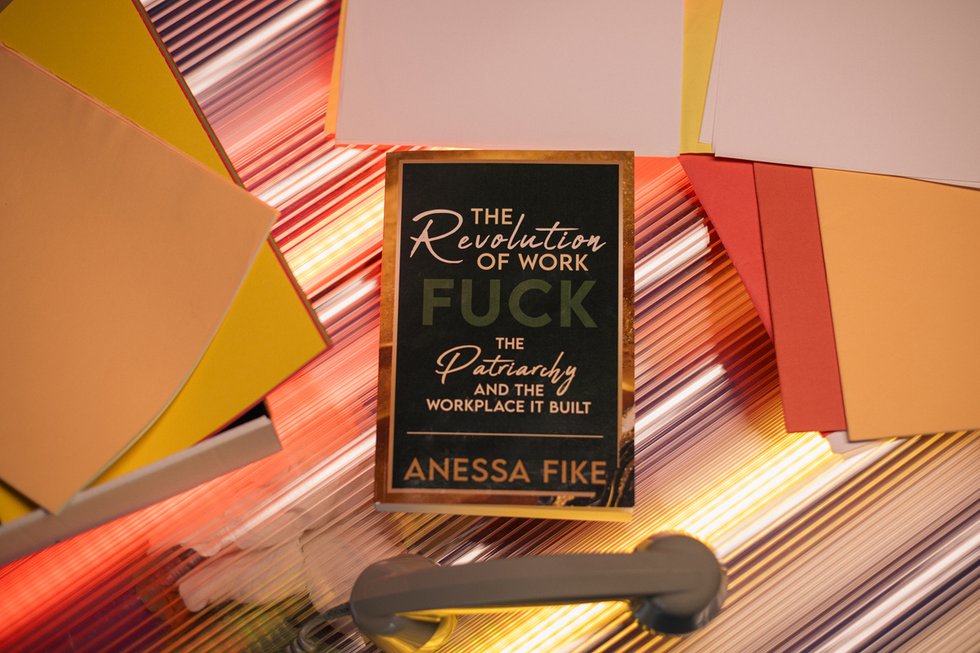Sh*t’s broken—Here’s how we fix work for good
23. 12. 2024
6 min.


US Editor at Welcome to the Jungle
Work isn’t necessarily broken—it’s working exactly as it was designed to. But that design? Flawed from the start. Built by and for a narrow few, today’s workplace systems still cling to outdated rules that reward conformity and punish difference—at least in the eyes of Anessa Fike, workplace strategist and founder of Fike & Co. She’s calling for something bigger than reform. She’s calling for a workplace revolution.
Fike has made it her mission to challenge the status quo and push companies toward more equitable, human-centered practices. Her book, The Revolution of Work: Fuck the Patriarchy and the Workplace It Built, dives headfirst into this movement, exposing the cracks in our current systems and laying the groundwork for a future that works for everyone.
Fike’s vision? Dismantle the old frameworks, question every so-called “standard,” and create a system where people—not power—come first. It’s not about fitting more people into the same broken mold. It’s about shattering the mold entirely.
The following article is adapted from an interview with Fike, edited for length and clarity.
The roots of patriarchal power in the workplace
It’s impossible to ignore the roots of our workplace systems. If you think about how this country was founded—who built the structures of government, law, and society—it’s clear that white men were at the center of it all. They weren’t building these systems with other groups in mind; they were creating a framework that benefited them. Everything we do today is still influenced by that original design, and we’ve had to spend centuries undoing it to make space for others.
“If you think about how this country was founded—who built the structures of government, law, and society—it’s clear that white men were at the center of it all.”
Take the Industrial Revolution, for example. The workforce wasn’t seen as a community of people with unique needs—it was viewed as a machine. Workers were treated like interchangeable parts, valued only for their productivity. This mindset still exists today, where people are forced into rigid boxes of what a ‘good worker’ looks like. And if you don’t fit into that mold, you’re seen as a problem. But the truth is, there’s no single way to be a productive employee or a successful employer. People are nuanced, and we need to embrace that instead of trying to make everyone conform to the same outdated standard.
Our current work structures are crumbling. Employee engagement is at an all-time low, stress and mental health challenges are rising, and people are questioning the value of their work. This isn’t a coincidence—it’s the result of a system that was never designed to support everyone.
In need of a workplace revolution
We’re living in a moment of major societal change, which makes it the perfect time to reimagine how we work. Political shifts are redefining norms, and people are feeling empowered to bring their full, authentic selves to the workplace. More importantly, the workforce itself is changing. Millennials and Gen Z are on track to make up the majority of workers, and they’re the most diverse generations we’ve ever seen in terms of race, gender, and identity.
“Our current work structures are crumbling…This isn’t a coincidence—it’s the result of a system that was never designed to support everyone.”
This is a pivotal shift in the power structure, creating a prime opportunity to dismantle old systems and build something new—not just tweak the existing one, but truly rebuild it with inclusivity and equity at the core. The future of work will be more representative of the full spectrum of humanity, rather than being narrowly focused on one demographic’s perspective. It’s a revolution that’s long overdue.
The revolution requires a fundamental shift in how we think about work. It’s not about one-off policies or temporary initiatives. It’s about tearing down the old foundations and building something better. This means considering every aspect of work—from pay to promotion to leadership to accountability. If we want lasting change, we can’t just put a Band-Aid on a broken system.
1. Compensation
It starts with compensation. It’s the longest chapter in my book for a reason. The majority of people are not independently wealthy, so we’re all working to live. However, the way we approach compensation is flawed. Most companies base their compensation strategies on data that’s seven to nine years old. These large data houses may claim their data reflects the last six months, but in reality, they’re only updating a few data points within a larger, outdated dataset.
This reliance on old data, plus the effects of inflation, creates massive wage gaps. We have to shift from focusing solely on market rates to ensuring that employees are paid fairly for their skills and experience—and that they’re able to live comfortably.
“Many people don’t realize that compensation is driven by supply and demand, just like milk, eggs, or gas.”
Many people don’t realize that compensation is driven by supply and demand, just like milk, eggs, or gas. But when companies don’t examine how they’ve historically paid certain employees—for instance, paying a white man $20,000 more annually than a Black woman in the same role—that gap compounds over time. We’re talking about hundreds of thousands of dollars in cumulative loss for that Black woman.
2. Representative leadership
One trend I’m optimistic about is seeing more diverse faces in leadership and c-suite positions. This shift will lead to more board positions for people from underrepresented backgrounds, create generational wealth in communities that haven’t seen it before, and generate a cyclical change in how power and influence are distributed.
“For too long, we’ve seen white men funding other white men to create the same systems that got us into the mess we’re in today.”
Although it is encouraging to see more women, non-white people, and people from diverse communities becoming funders and founders, we aren’t seeing nearly enough of this, and it’s too slow coming. For too long, we’ve seen white men funding other white men to create the same systems that got us into the mess we’re in today.
3. Holding the higher-ups accountable
Another big change that I’m starting to see, but need to see way more, is that funders are holding founders accountable in ways they didn’t before. They’re demanding that founders care about DEI and how they treat employees.
For years, white male founders weren’t held to these standards, and that’s part of why we’ve seen so much harm in certain industries. But with a more diverse pool of funders, we’re seeing expectations shift, and I’m hopeful that this will lead to better workplaces.
Facing resistance—or lack thereof
Surprisingly, I’ve seen less resistance than I expected for my book and this mindset around the revolution of work. Still, there continues to be resistance from those who hold the most power around funding cycles, losing an ounce of power so that others may have some, and allowing an abundance instead of a scarcity mindset to take over.
People don’t want to give up power easily. Some will do it willingly for the betterment of humanity, but others will cling to it until their last breath. The ones with the most power often use defense mechanisms like subterfuge, ridicule, and deflection to maintain control.
“People don’t want to give up power easily. Some will do it willingly for the betterment of humanity, but others will cling to it until their last breath.”
I’ve also noticed that some of these people have a deep insecurity that’s tied to their sense of competence. They’re afraid people will realize that they’re not actually as skilled as they’ve been perceived to be and that their status is a result of privilege, not ability.
That’s why I’m hopeful about the workplace revolution. It’s forcing people to confront a mirror they’ve tried to avoid for too long. You can only look away for so long before you’re forced to face yourself. We’re going to need white men in this revolution because they still hold so much power. But I’m hopeful that more people will recognize their insecurities, own up to them, and be open to learning and doing better.
“That’s why I’m hopeful about the workplace revolution. It’s forcing people to confront a mirror they’ve tried to avoid for too long.”
A reimagined world of work
Everything should change. We spend a third of our lives at work, yet it’s the one area that’s not personalized. Imagine workplaces where people actually want to be—no more ‘Sunday Scaries,’ no more feeling stuck in meaningless tasks. Instead, people feel their careers are progressing and their work matters.
“If we rebuild work the right way, it can be as enjoyable as other parts of life.”
If we rebuild work the right way, it can be as enjoyable as other parts of life. Right now, 77% of workers are disengaged—imagine if they were highly engaged. When people love their work, productivity rises, outcomes improve, and companies save money. The cycle feeds itself. But if we stay stuck in this disengagement cycle, it’s going to keep hurting employees, companies, and customers alike.
Photo: Welcome to the Jungle
Follow Welcome to the Jungle on Facebook, LinkedIn, and Instagram and subscribe to our newsletter to get our latest articles every week!

Viac inšpirácie: DEI

What Kamala Harris’s legacy means for the future of female leadership
The US presidential elections may not have yielded triumph, but can we still count a victory for women in leadership?
06. 11. 2024

Leadership skills: Showing confidence at work without being labeled as arrogant
While confidence is crucial, women are frequently criticized for it, often being labeled as arrogant when they display assertiveness.
22. 10. 2024

Pathways to success: Career resources for Indigenous job hunters
Your culture is your strength! Learn how to leverage your identity to stand out in the job market, while also building a career
14. 10. 2024

Age does matter, at work and in the White House
What we've learned from the 2024 presidential elections about aging at work.
09. 9. 2024

Crafting your personal brand during a name change
A name change can redefine your personal brand. So, how can you leverage your online presence?
04. 9. 2024
Novinky, ktoré to vyriešia
Chcete držať krok s najnovšími článkami? Dvakrát týždenne môžete do svojej poštovej schránky dostávať zaujímavé príbehy, ponuky na práce a ďalšie tipy.

Hľadáte svoju ďalšiu pracovnú príležitosť?
Viac ako 200 000 kandidátov našlo prácu s Welcome to the Jungle
Preskúmať pracovné miesta